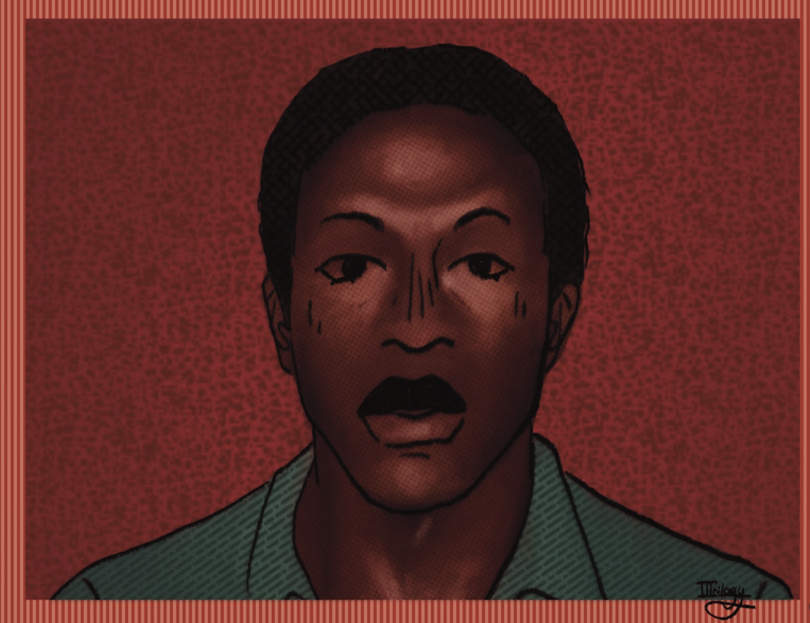Daniel Caesar reconciles with earthly, heavenly fathers in ‘Son of Spergy’

"Son Of Spergy" uses powerful gospel voices, meaningful lyrics and subtle instrumentation to envelope listeners in his path to closure, our columnist says. Sarah Yudichak | Contributing Illustrator
Get the latest Syracuse news delivered right to your inbox.
Subscribe to our newsletter here.
On the weekend of his high school graduation, Daniel Caesar found his belongings in the garbage outside his home. His relationship with his family broke down. Caesar spent the next eight months couch-hopping and sleeping on park benches in Toronto. This instability brought him to his debut EP, “Praise Break.”
Eleven years later, “Son Of Spergy” is a “full-circle moment” as Caesar looks to reconnect with his past. He’s surrounded by collaborators from his first EP — Jordan Evans and Matthew Burnett — as well as his original management team. Feeling at home, he looks to push through his childhood trauma.
The album, released on Friday, is a roadmap of Caesar’s journey to reconcile with his faith and father.
Caesar’s father, Norwill Simmonds, is a Jamaican-based gospel singer and pastor who taught him how to sing as part of the church’s choir. The album’s title refers to Simmonds, whose nickname was spergy.
Caesar described the album’s central theme as about his faith, but more importantly, his relationship with his father.
The 12-track, 51-minute album features artists like Sampha, Simmonds and 646yf4t — pronounced “baby fat,” Caesar’s little brother. All these features enhance the journey of reconnection that Caesar takes his listeners on.
Caesar released three lead singles — “Have A Baby (With Me),” “Call On Me” and “Moon” — which have garnered over a million views combined on YouTube prior to the album’s release.
The album opens with “Rain Down.” The song begins with a simple piano hymn, before rapidly layering gospel vocals and subtle instrumentation that completely envelops the listener.
The track marks the start of Caesar’s path to reconciliation, as he openly asks for forgiveness for his past sins. The powerful gospel vocals mixed with Caesar’s voice put listeners in the front row of the Simmonds’ family church.
In “Have a Baby (With Me),” Caesar reflects on a time when his life consisted of unrequited love and self-doubt. Though he already knew his partner had emotionally moved on from their relationship, he remained paralyzed by the fear of being alone.
Next, “Call On Me” experiments with the album’s first pop track. The resulting sound is catchy yet hollow, mirroring the toxic and transactional relationships he was in. Caesar was stuck in a cycle, lusting after women who used him for his money while he used them for companionship.
“You change your energy when we get home / Get what you need and then I’m all alone,” he sings.
At this point in the album, Caesar moves away from dwelling on his sins. He’s ready to move forward, but is simultaneously ashamed and uncertain.
Caesar rekindles his connection with Christianity in “Baby Blue,” a track featuring his father. While he was required to participate in religion when he was younger, now Caesar is actively choosing his spiritual path.
But in “Root of all Evil,” Caesar struggles to follow his newfound spirituality. His lustful tendencies and surrounding influences conflict with his desire to stay true to himself, leading to internal shame when they take control. Caesar wonders if he strays due to the temptations surrounding him, or due to fears born from religious trauma.
“I know I should stay away but I can’t / I’m too drawn to the evil / I know that I’ve gone astray, here I am / So many pretty people,” Caesar sings.

Ilyan Sarech | Design Editor
These fears and feelings of uncertainty fully manifest as self-doubt on “Who Knows.” Caesar starts to question everything, wondering if it’s even possible for him to achieve or succeed in anything.
This questioning continues on “Moon.” The song is broken up into two distinct parts.
At first, Caesar says he’s tired of fighting by himself to improve, wondering who will support him.
“Who’s gonna be my Jesus? Who will advocate?”
The second section, dubbed “Violence,” delivers an otherworldly response. As organs harmonize with angelic vocals, a spiritual presence tells Caesar that his current path to reform is flawed. To truly heal, he must abandon his anger and shame, stop fighting and learn to love himself.
The spiritual dialogue continues on “Touching God,” where Caesar uses these conversations to highlight the difficulty of his new path. As a pastor’s son who ran from his faith, accepting religion again means directly facing his childhood trauma.
“I know there’s a God that’s withholding his help / I know you made me, but I hate myself,” Caesar sings.
Caesar experiences a breakthrough in “Sign Of The Times.” He reflects on growing up and turning 30, which creates a desire to settle down and raise a family. Even though he’s matured, he’s still fundamentally himself at the core, and that excites him.
“It might be too late / I’ve gone, and spilled my guts / But it feels so great, it’s risky / So what?”
In the album’s final moments on “Emily’s Song” and “No More Loving (On Women I Don’t Love),” Caesar reflects on his past relationships. Instead of being ashamed, he uses this moment to thank these women for their love and the lessons they imparted. He confidently declares that he’s moved past all superficial relationships and is ready to pursue his new path.
“I’ll never rеgret you, it’s heaven that sеnt you / But I’ll never go back, I hope that you know that.”
The album’s final track, “Sins Of The Father,” is Caesar’s reflection on his relationship with both his earthly and heavenly fathers. In two parts, the track begins by detailing the pain Simmonds inflicted. Despite this, he hopes they can be together in heaven.
Caesar hopes religion will fill the void left by his father. He confesses to holding onto anger and resentment in his heart and pleads for God to take away this pain.
After a hard cut, all the gospel choirs and instrumentation are gone, leaving only Caesar and his piano. In the second section of the song, Caesar uses a simple chord to reflect on his father’s careless energy and forgetful nature, detailing how his dad missed big life events like his birthday.
While he recognizes he has childhood trauma from his father, he feels grateful he has the ability to forgive and forget this pain. “Sins Of The Father” and “Rain Down” seamlessly transition into each other, showing the cyclical nature of childhood trauma.
“Son Of Spergy” is a personal account of Caesar learning to release the pain from his childhood and accept himself. It’s a journey that’s complicated by the realization that he’s his father’s son in more than one way. Caesar finally finds closure and breaks his family’s cycle of trauma.





